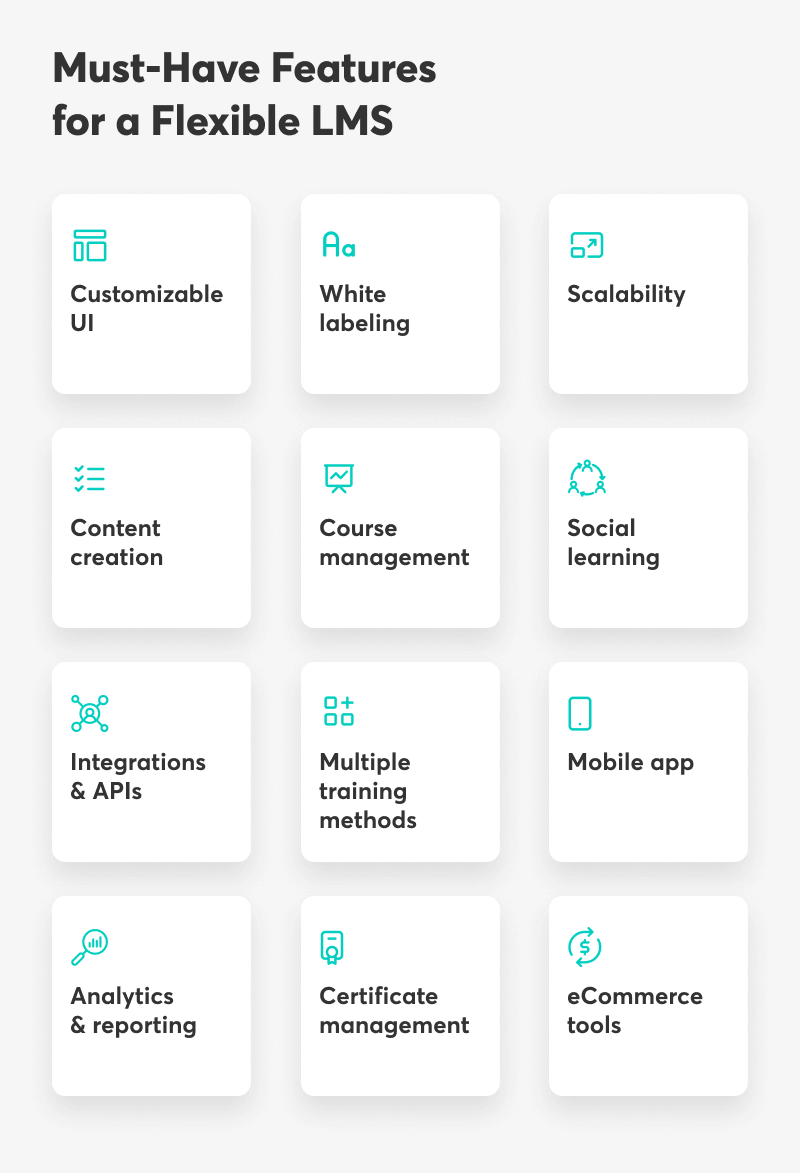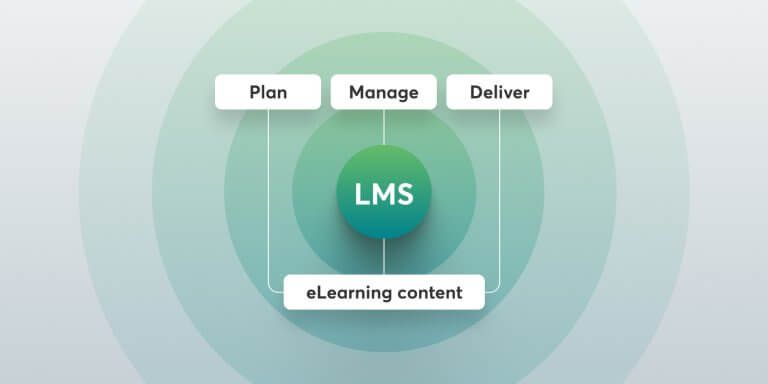Harness the Power of a Flexible LMS for Seamless Online Training

Table of Contents
The 2023 Workplace Learning Report shows that 83% of organizations are working toward a people-centric culture, as they believe that people and skills are the foundation of organizational success. To successfully upskill their workforce and improve company culture, they’re focusing on Learning and Development (L&D) initiatives.
Offering continuous employee training has significant benefits all around – employee performance and productivity improve, new opportunities for career growth arise, and employees are more satisfied with their jobs and more likely to stick around.
A competent workforce also means that your company can navigate the future confidently, remaining competitive and even leading innovation.
Using a flexible Learning Management System can help you foster a learning culture and deploy effective, engaging learning programs that are not a burden to your employees’ pressing workload.
In this article, we’ll see how a flexible LMS like LearnWorlds can support your training initiatives, with examples of different industries that could truly benefit from an LMS solution.
But first, let’s see how you can identify a flexible LMS among all the choices available.
Unlock the power of your organization’s learning potential with our cutting-edge LMS RFP Template. This game-changing resource empowers you to seize control of the procurement process and secure the perfect LMS for your unique needs.
With its meticulously crafted sections and insightful questions, our template transforms the tedious RFP journey into an exhilarating quest for innovation and excellence.
Table of contents
Top Features to Look for in a Flexible LMS
There are perhaps too many options in the LMS market. Choosing the best LMS for your online training needs is tricky if you don’t know what features to look for.
So let’s see the features of a flexible LMS that will meet your needs and, then, how these features are tied to organizational and learning benefits.

1. Customizable user interface
A flexible LMS enables you to create the learning environment that you want.
Pre-made templates and themes should be available to help you get started, but you should also be able to customize the colors and fonts, move around page sections, insert widgets and popups, and add custom code.
2. White labeling
White labeling will enable you to build a familiar learning environment and create strong mental correlations with your company.
Branding is all the more important if you’re planning to offer customer education or extended enterprise training.
Look for a fully white-labeled LMS that allows you to build a custom domain and remove all the LMS branding.
3. Scalability
At the core of a flexible LMS lies the ability to support growing training needs as they arise.
Your LMS should support an unlimited number of users, courses, and administrators with minimum downtimes. Other aspects of scalability are multi language support and multi-tenancy.
4. Content creation & course management
Many heavyweight LMSs take months to set up, while implementation often needs to be done by the LMS provider.
With a flexible LMS, instead, you won’t require technical assistance to get started, as it will provide you with many options to build the course you need, on your own, without limitations.
Flexible LMSs feature built-in authoring tools and support several types of content (video, audio, and text). They should also provide you with many options to manage your course, like setting prerequisites and drip-feeding content.
You should also be able to manage users as well, by assigning custom user roles depending on the access level they have to your platform and facilitate admin tasks like user enrollment.
5. Social learning
All work and no fun is boring; the same is true with online learning. A program that is carried out exclusively with training content feels one-sided and passive. Although offering diverse learning material helps keep things exciting, there’s nothing better than interacting with peers and instructors.
A flexible LMS offers ample opportunity for interaction through discussion forums and groups, live sessions, and some friendly competition by gamifying the learning experience. It offers a space where employees can share knowledge and experiences without the noise of social media platforms.
6. Integrations & APIs
Working with APIs and integrating the tools you’re already using will help you shape your LMS into a fully functional tool, custom-tailored to your needs, to facilitate training delivery and all relevant tasks.
Although there are thousands of options, some integrations to look for are Zapier, video conferencing tools, payment processors, and marketing tools.
7. Multiple training delivery methods
Flexibility is closely linked to options. You should have plenty of options to deliver training to your employees.
Think about blended learning, hybrid learning, instructor-led training, cohort-based courses, or self-paced learning.
Your needs might vary across departments or job roles, so your LMS should enable you to combine or pivot from one option to another.
8. Mobile app
Building a mobile app means you’ll follow a mobile-first approach to meet the training of deskless employees, like medical professionals and sales assistants.
Training is delivered on mobile devices either exclusively or in addition to a “traditional” online training platform.
Look for an LMS that offers the option to launch your very own branded mobile app as effortlessly as possible.
9. Analytics & reporting
A flexible LMS has extensive reporting capabilities. You should be able to get different insights, create customizable reports to drill down to the information that matters the most, and have them delivered to your inbox/dashboard at specific dates.
Access to data gives you the knowledge to make changes necessary to improve your program.
10. Certificate management
Organizations that must comply with industry regulations or have strict internal procedures will benefit from a flexible LMS with a certificate builder.
Ideally, the system should allow you to set expiration dates and notify learners when their certificates are about to expire.
11. eCommerce tools
eCommerce tools, like payment processors, flexible payment options, and email marketing automation, are also features of a flexible LMS. These features will enable you to sell online courses or paid online events like webinars and workshops to a wider audience. You could even create a membership site with gated content and exclusive events for your loyal customers.
9 Benefits of a Flexible LMS
Still wondering why you should invest in a flexible LMS? Discover the undeniable benefits of investing in a flexible LMS with these nine compelling benefits outlined below.
1. Create an appealing learning environment
With a flexible LMS, the learning environment can be modified to create the energy you want depending on the goals of the training.
For instance, you might want to create a calm environment for healthcare training addressed to patients, or a more vibrant and energetic one for your salespeople.
And it’s not just about the looks – a learning environment that is intuitive and easy to navigate makes it easier for learners to pick up where they left off and find the resources they need when they need them.
💁 LearnWorlds allows you to build beautiful courses with a few clicks. With our fully customizable industry-specific templates and pre-built pages, you can build your course website as you like. You’ll be in total control of your school’s look and feel, and even add custom code.
Our course player is also powerfully customizable – you can choose the course player skin that you prefer, add or remove additional tabs and information, play around with the navigation buttons, and much more! Plus, you can truly white-label your training program.
2. Meet evolving training needs
As your company grows, your training needs will evolve. You may have to deploy training on a larger scale and on a regular basis.
You may also need to become GDPR compliant if you plan to sell corporate training courses to EU customers.
A flexible LMS can satisfy these requirements and allow you to offer seamless training experiences no matter the size or location of your audience.
💁 LearnWorlds supports unlimited courses and users. You can also assign 20 different user roles (unlimited admins and custom roles are available with our Corporate Plan) to restrict access to essential-only user information and protect your users’ privacy.
With bulk actions, you can easily carry out administrative tasks like user enrollment, deletion, etc. We even offer a GDPR-compliance toolkit that checks all the boxes of GDPR regulations.
3. Create & manage courses easily
Whether you’re creating your training courses internally or have hired an external team for that, the course creation process will run smoothly.
Besides, training is not a one-time event – you want to be able to create as many upskilling programs as possible.
💁 Setting up a training course with LearnWorlds is super easy! Our course builder has a straightforward user interface (UI) that allows you to build your course and break it down into sections and add your preferred learning activities, including SCORM files.
4. Create flexible learning experiences
A flexible LMS enables you to deliver training as you see fit according to your organizational needs.
For smaller companies, a blended learning approach where most of the training takes place online and is supported by online material will do. Larger companies with employees all over the world might need to offer their training exclusively online.
The scenarios are endless, but it’s important to play out the scenario that best works for your organization to create training that fits into your employees’ schedules and streamlines your L&D efforts.
💁 With LearnWorlds, you can deliver learning any way you like. Apart from asynchronous courses, our platform integrates with video conferencing tools to support hybrid and blended learning, VILT sessions, and live events like webinars and workshops.
All our courses are mobile-friendly, but if you need to prioritize mobile learning, you also have access to your own native mobile app.
5. Create effective training programs
An effective training program is ultimately one that helps employees meet the learning objectives of the program.
But how do you achieve that when everyone learns differently? Here comes the beauty of a flexible LMS.
An LMS can help you address the different learning preferences of your visual, auditory, and kinesthetic learners. And it can also address the specific needs of your training program.
When deploying a compliance program, for example, you will need powerful assessment activities.
💁 LearnWorlds supports diverse content for all learning preferences: interactive video, podcasts, eBooks, PDFs, live sessions, and assessments.
Our platform additionally offers multiple features to enhance accessibility for learners with disabilities, like subtitles, interactivity, audio/written/video assignments, and simple and customizable UI to adjust the colors, size font, and navigation buttons.
6. Achieve higher engagement
Learner engagement can be an issue for training – be it on-site or online. Social learning and gamification can come to the rescue, though, and add that much-needed interactivity and fun to the scene, therefore increasing learner engagement.
And don’t underestimate the importance of engagement – no one ever learned sufficiently while being bored.
You want your employees to “live” the training experience and become active participants to really internalize knowledge. Social learning will help employees learn through casual discussions and exchanging knowledge in a much more relaxed and surprisingly effective way.
💁 LearnWorlds has built-in community features: blog, course discussions, community page with groups and shared content and polls.
7. Sell your courses
Larger companies can make a profit and further establish their brand by building a membership site or selling corporate training.
Why miss out on the opportunity to strengthen the bond with your customers by offering additional resources on how to use your product or tips and news related to your industry?
💁 LearnWorlds offers all the tools you need to sell corporate training, with white labeling, a mobile app, interactive content, and robust marketing tools (from affiliates to email marketing) to capture leads and stay in touch with your customers.
Create an exclusive portal for your customers via a membership site where you can host live events, build a blog, share learning materials like videos and eBooks, and build a community for customers to interact and share tips!
8. Ensure compliance
Compliance is usually mandated by governmental regulatory bodies. However, it may also involve internal procedures, like workplace safety or anti-harassment policies.
With a flexible LMS, you don’t have to worry ever again if everyone on your team is up to par with the latest regulations or if they’re following the required safety procedures. Because it offers you three powerful weapons to stay on top of compliance – assessments, certificates, and reporting.
💁 LearnWorlds has an impressive Assessment Builder that supports graded and non-graded assessment activities, including Multiple Choice, Match & Ordering, File Assignments, and many more.
Our assessment settings can be customized, as you’re able to set specific scores, offer automated or manual feedback, set a time limit, enable multiple attempts, and more.
Make sure to link an exam to a Certificate of Knowledge and award your successful learners with it. Build customizable certificates with unique identifiers, expiration dates, and more options to personalize your certificates.
With our Course Insights feature, you can monitor at a glance the state of compliance in your company by getting information like the number of certificates issued and average scores. Plus, you can monitor each employee’s performance down to the detail.
9. Monitor your training initiatives
Although employee performance gets most of the attention, you shouldn’t neglect to monitor how your training programs perform either. This will enable you to build more relevant courses and keep offering truly beneficial courses for your employees.
💁 Our Reports Center allows you to set filters and customize your reports (some are available to schedule). You can track every detail about what’s happening, see individual scores, how much time learners spend on each activity, and how courses perform over time.
How Different Industries Can Benefit From a Flexible LMS
Final stop – use cases of a flexible LMS for online learning.
Enterprises
Large companies are often leaders in their industries. The competition is fierce, and the pressure to retain their authority is ongoing.
A flexible LMS can help them offer continuous education to their employees and prepare them for the changing work landscape and technological advancements.
At the same time, they can deploy customer education programs at a scale, leveraging the branding and eCommerce capabilities of their LMS.
Higher education organizations
As traditional academia declines in popularity, largely due to the prohibiting cost in many countries, students are turning online for more flexible and affordable yet equally reliable education.
Distinguished learning institutions already offer their programs exclusively online or in hybrid mode, facilitating student-centered education and creating personalized, modern learning experiences.
Healthcare & MedTech
Healthcare and MedTech can safely rely on a flexible LMS to train employees, patients, and external partners to comply with industry regulations and improve patient outcomes.
Patients have access to training material that helps them understand their condition better and learn how to use medical devices, significantly improving their quality of life.
With features like mobile apps for on-the-go learning and versatile content easily accessible in one place, both healthcare professionals and patients have access to valuable learning resources.
Finance
Another industry with strict regulations and compliance requirements, finance can use a flexible LMS to deploy streamlined training at a scale and ensure compliance across every touchpoint.
Non-profits
A flexible LMS can help enhance volunteer training and capacity building through engaging learning activities. With its social learning and community-building features, it can further strengthen the bond and improve cooperation among volunteers.
Last but not least, using email marketing and affiliate tools, nonprofits can raise awareness about their mission and engage more people to join their cause.
Chart Your Path To A Flexible LMS
With a flexible LMS, your workforce becomes agile and primed to conquer new frontiers, propelling your business to unparalleled heights.
The greatest advantage of a customizable LMS lies in its adaptability to cater to diverse training requirements across a wide spectrum of audiences.
Experience firsthand the true potential of tailored learning solutions that align with your unique organizational goals and unleash the full potential of your team. Get started today with LearnWorlds and claim your 30-day free trial!
Further reading

Androniki Koumadoraki
Androniki is a Content Writer at LearnWorlds sharing Instructional Design and marketing tips. With solid experience in B2B writing and technical translation, she is passionate about learning and spreading knowledge. She is also an aspiring yogi, a book nerd, and a talented transponster.




